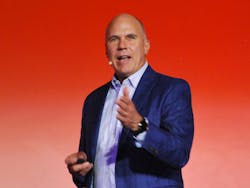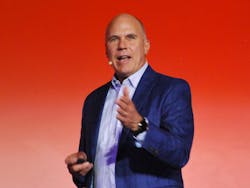Industry reaps benefits of COVID response
Technology is more powerful when it has a clear business problem to solve. Never has this been more evident than over the past few years, when the COVID pandemic changed the way people interact and the way businesses operate.
Mark Bulanda, executive president, Emerson Automation Solutions, cited this truth to almost 2,500 attendees, many participating in their first live events since the global shutdown, during the opening session of Emerson Exchange in Grapevine, Texas. He also stressed the importance of leaving a habitable planet to future generations, as well as working with like-minded partners that can have a profound impact on business.
In February 2021, when Bulanda took the reins of Emerson Automation Solutions, replacing Lal Karsanbhai, who then became Emerson CEO, the world was still wondering if and when it would return to some sense of normalcy.
“Fast Internet had become a requirement,” explained Bulanda, who noted phrases such as “masks required” and “curbside service” and “you’re on mute” had become part of the new vernacular. Remote and autonomous capabilities suddenly became more realistic, he said.
“What our operations did was critical,” emphasized Bulanda, who attributed the company’s tactical pivot to the mandate that forced not just Emerson, but the global economy, to rethink collaboration. “Our personal connection to the outside world came through the Internet,” he explained.
The pulp-and-paper industry was impacted by a 50% increase in online shopping. The metals-and-mining industry quickly rebounded after a short-lived initial fall in prices. But the big impact was seen in life sciences, which was able to streamline life-saving vaccine development from the previous four-year record into just one year. Global production helped pharmaceutical companies to put the world on their collective back and get through COVID, said Bulanda. And digital automation played a key role in all of that.
Bulanda cited S&P Global’s probability-of-default model, which identified the five industries most negatively affected by COVID-19. They included airlines; automobiles; energy equipment and services; hotels, restaurants and leisure; and specialty retail. Conversely, and of note, the five industries that have been least impacted by COVID-19 include communications equipment; health-care equipment and supplies; life-science tools and services; pharmaceuticals; and real estate investment trusts (REITS).
“The probability of default is the likelihood of not paying your debts,” explained Bulanda. “Every industry was rocked because of COVID.” However, many industries reversed their fortunes. Containers and packaging saw an increase because of the rise in deliveries, and the oil-and-gas industry was buoyed by home heating.
“The shortage of semiconductors has affected everything,” noted Bulanda. “Nearly everything with a power supply was affected. Our procurement teams are working with suppliers to maximize components. We’re aggressively searching for new providers, and we’re developing new alternative technologies. Lead times have begun to return to pre-pandemic levels.”
Amid companies fighting for business sustainability because of COVID, the world had another priority—decarbonization. “It has become a generational imperative,” said Bulanda. “We drive innovation to make the world healthier, safer, smarter and more sustainable—and the Plantweb ecosystem is the most complete portfolio of solutions for achieving these goals. And the addition of AspenTech deepens our ability to provide asset optimization at all levels.”
The Purdue model, which used to establish an “air gap” between layers of an industrial-control-system architecture, may no longer be optimal in the age of digital transformation, Bulanda added. Hierarchical data limits analysis. Organizations need a seamless architecture from the field to the edge to cloud to enable boundless automation, he said. “Autonomy is driving this more advanced automation strategy.”
Get the best of Emerson Exchange Americas 2022
When the event comes to a close, the best, most important coverage will be compiled into a report. Register now to pre-order the report and be among the first to receive it in your inbox.


